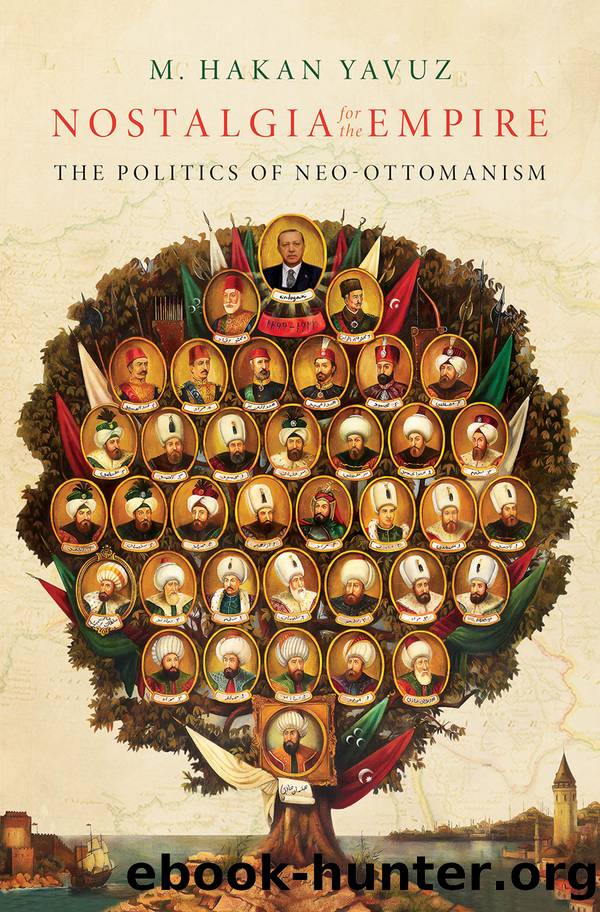Nostalgia for the Empire by Yavuz M. Hakan;

Author:Yavuz, M. Hakan;
Language: eng
Format: epub
Publisher: Oxford University Press, Incorporated
Published: 2020-02-15T00:00:00+00:00
The Ottoman Islamic Heritage as the Foundation of the Nation
The heritage of the Ottoman Islamic civilization for ErdoÄan is not an unconditional set of values but rather a logos that orients the daily life of a community and provides meaning to actions, decisions, and relationships. Moreover, it is an emancipating force against oppression and foreign domination that determines a communityâs core values. It is a religious tradition that gives coherence, unity, and solidarity to social practices. ErdoÄanâs understanding of Islam is deeply shaped by his idealized Ottoman memories, the aggregate of secular versus Islamic political rivalry, Islamic intellectual traditions and movements, and the economic and political development of Turkey. The cultural as well as dogmatic aspects of Islam are critical in comprehending ErdoÄanâs worldview. By culture, I mean a set of values, myths, and beliefs that shape oneâs everyday life practices. The oppositional history of Turkish Islam in the Kemalist Republic is also a part of ErdoÄanâs political personality. Mustafa Kemal and his colleagues worked strenuously to fence out the social and political manifestations of Islam in the public square with the idea of ultimately having it disappear. These founding fathers regarded Islam as a foreign relic of the Arabian past and the cause of economic and social backwardness, which prevented Turkey from assuming its rightful place as a âcivilizedâ Western nation. The historical backdrop against which ErdoÄanâs personality and his understanding of politics were formed was the kulturkampf between the Ottoman Islamic legacies and the militantly secular Kemalist ideology which sought to displace them.
In Turkey, the rise of Islamism and nationalism are mutually inclusive processes. This Islamo-Turkish revival is usually carried out through a reconfiguration of Ottoman memory. There is always the potential for a dormant nationalist rejuvenation within the Islamic revival, as Turkish nationalism is ultimately closely knitted within an Ottoman-Islamic framework. Thus, in the most critical times of ErdoÄanâs tenure, Turkish nationalists always have supported him. ErdoÄanâs nine consecutive electoral victories could be seen as the revenge of a suppressed Islamic periphery against Turkeyâs secularized and Western-oriented elite. He seeks to redefine the sense of community in terms of the coreâIslamic/Ottomanâvalues of who is âinâ or âout.â ErdoÄan has used his power to âde-ethnicizeâ the population from its narrow ethnic-nationalism (Turkish/Kurdish) but also to âre-Islamicizeâ it by stressing Islamic values as a unifying reference point and the Ottoman Empire as a shared history. ErdoÄanâs educational and social policies are consciously designed to weaken secular identity and to strengthen subnational (e.g., Albaian, Bosniak, Torbes, Pomak, Kurd, and Georgian) identities under an overarching Ottoman Turkish/Muslim one.
For ErdoÄan, being a Turk stems neither from blood ties nor from formal legal citizenship in the Western sense. Instead, it is a commitment to Islam and the Ottoman heritage to protect and perpetuate the faith with the goal of maintaining social integration and restoring the greatness of the Ottoman Turks. Of course, what it means to be a Turk will never be a settled question.34 Turkishness, for Atatürk, was based on a âwe feeling,â explained later by Karl W.
Download
This site does not store any files on its server. We only index and link to content provided by other sites. Please contact the content providers to delete copyright contents if any and email us, we'll remove relevant links or contents immediately.
| Bahrain | Egypt |
| Iran | Iraq |
| Israel & Palestine | Jordan |
| Kuwait | Lebanon |
| Oman | Qatar |
| Saudi Arabia | Syria |
| Turkey | United Arab Emirates |
| Yemen |
Empire of the Sikhs by Patwant Singh(22696)
The Wind in My Hair by Masih Alinejad(4781)
The Templars by Dan Jones(4521)
Rise and Kill First by Ronen Bergman(4479)
The Rape of Nanking by Iris Chang(3966)
12 Strong by Doug Stanton(3360)
Blood and Sand by Alex Von Tunzelmann(3001)
The History of Jihad: From Muhammad to ISIS by Spencer Robert(2468)
Babylon's Ark by Lawrence Anthony(2381)
The Turkish Psychedelic Explosion by Daniel Spicer(2208)
Gideon's Spies: The Secret History of the Mossad by Gordon Thomas(2196)
No Room for Small Dreams by Shimon Peres(2195)
Inside the Middle East by Avi Melamed(2185)
Arabs by Eugene Rogan(2153)
The First Muslim The Story of Muhammad by Lesley Hazleton(2113)
Bus on Jaffa Road by Mike Kelly(2004)
Come, Tell Me How You Live by Mallowan Agatha Christie(1990)
Kabul 1841-42: Battle Story by Edmund Yorke(1894)
1453 by Roger Crowley(1827)
